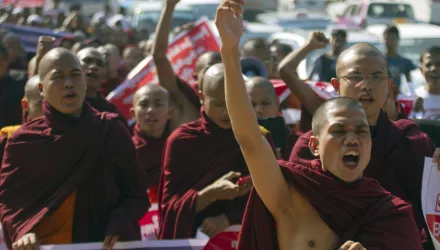What should we make of these developments related to the Palestinian-Israeli conflict that occurred Thursday? Someone in Gaza fired a projectile at southern Israel and Israel’s military responded by attacking some Hamas facilities in northern Gaza. This happened on the day when Israel celebrated its national independence day, which Palestinians mark as their catastrophic day of national shattering, subjugation and exile. U.S. Vice President Joe Biden in Israel said that if Israel were ever in trouble, the United States would fight for it and protect it. In Washington, the House Ways and Means Committee passed a global trade bill but included in it a provision that the U.S. government should work to prevent Europeans from adopting measures to support any trade sanctions or boycotts against Israel because of its illegal exploitation of Palestinian territories. At the Palestinian Birzeit University, Hamas won the student council elections, reversing decades of Fateh control. The UN agency responsible for providing Palestinian refugees with essential needs, UNRWA, noted that eight months after the devastating Israeli destruction of many parts of Gaza, not a single destroyed home has been rebuilt, and 100,000 Palestinian refugees remain homeless.
These various developments are important, but not because any of them are particularly new. We have witnessed them all for two generations or more, in the military, political, diplomatic, colonization, terror, and resistance arenas. Precisely because we have witnessed such dynamics for decades, the events this week should be a wake-up call. Their recurrence decade after decade means that we are stalemated in this conflict, and we know from experience that stalemates never last very long. They always — always — lead to some explosive development that causes suffering all around, such as wars, intifadas and non-violent resistance, terror attacks by Palestinian militants or Zionist settlers, heightened Israeli official colonization, or other such troubling issues that attempt to break the stalemate and achieve victory for one side or the other.
The big problem is that victory is unachievable through the means that both sides have been using, mainly bogus American-mediated peace talks, Zionist militarized colonialism, or Palestinian armed resistance. The Palestinian-Israeli conflict is stalemated, and the existing policy responses by both sides are exhausted failures.
So what should we do in such situations? Well, we should do what any human being should do when facing a perplexing dilemma. Read a book. In this situation, I recommend reading a book that came out some months ago that radically shakes up all the failed old views on how to try to resolve this conflict, and suggests a provocative and daring new approach to peacefully meeting the national rights of Israelis and Palestinians. The book entitled One Land, Two States: Israel and Palestine as Parallel States (University of California Press, 2014) is co-edited by two knowledgable men who have many years of experience in the region, Swedish diplomat Mathias Mossberg and American activist-scholar Mark LeVine.
The book emerged from several years of private discussions among Israelis, Palestinians and others who dared to explore new ways of sharing the land that both sides claim and covet, while implementing a concept of “shared rather than competing claims of sovereignty.” My own interactions with the authors and their colleagues in recent years, not to mention closely following conventional Israeli-Palestinian-American peace-making efforts for nearly half a century, convinces me that the radical ideas set forth in this book are just the kind of intellectual jolt we need to look afresh for new ways to meet the legitimate needs and rights of Israelis and Palestinians, within the entire historical land of Palestine, from the Mediterranean Sea to the Jordan River.
The editors say that at the heart of the novel concept of two parallel state structures exercising sovereignty over the same piece of land is, “the still-novel idea of states responding primarily to their citizens, and only secondarily to their territory.”
Palestinians and Israelis could live anywhere in the entire single land, but their personal and national sovereign rights would be protected by respective Israeli and Palestinian state structures that overall in places and remain distinct in others. This idea is a possible antidote to the failed one-state and two-state approaches to resolving this conflict.
Those who pondered the heavy logistical challenges of a parallel states concept worked for several years to generate novel ideas and proposals that are covered in chapters on parallel sovereignty, divided and shared core state functions, security strategies from both perspectives, economic issues, judicial matters, religion, and other related matters. That credible, politically savvy, Israelis, Palestinians and respected international scholars and diplomats— not wild men in Washington — came up with these fresh ideas adds credibility to the venture. This is not a blueprint for a permanent agreement, but rather intellectual and political stimulants — even shock therapy — to jolt us out of our recurrent stalemate-that-guarantees-renewed-war-soon.
The events I mentioned at the start of this column that took place this week should be as strong a reminder as we need that the old ways have failed consistently, and we would be criminally irresponsible to keep pursuing futile approaches. If we do not consider new ways to achieve a comprehensive peace settlement that responds to the just demands of both sides, we will only guarantee that we will keep responding to the political extremism, militant religiosity and hardened despair on both sides that perpetually fuel rockets and death.
Rami G. Khouri is published twice weekly in the Daily Star. He was founding director and now senior policy fellow of the Issam Fares Institute for Public Policy and International Affairs at the American University of Beirut. Follow him on Twitter @ramikhouri.
Khouri, Rami. “A Needed Intellectual Jolt to Israel-Palestine Justice and Peace.” Agence Global, April 25, 2015



